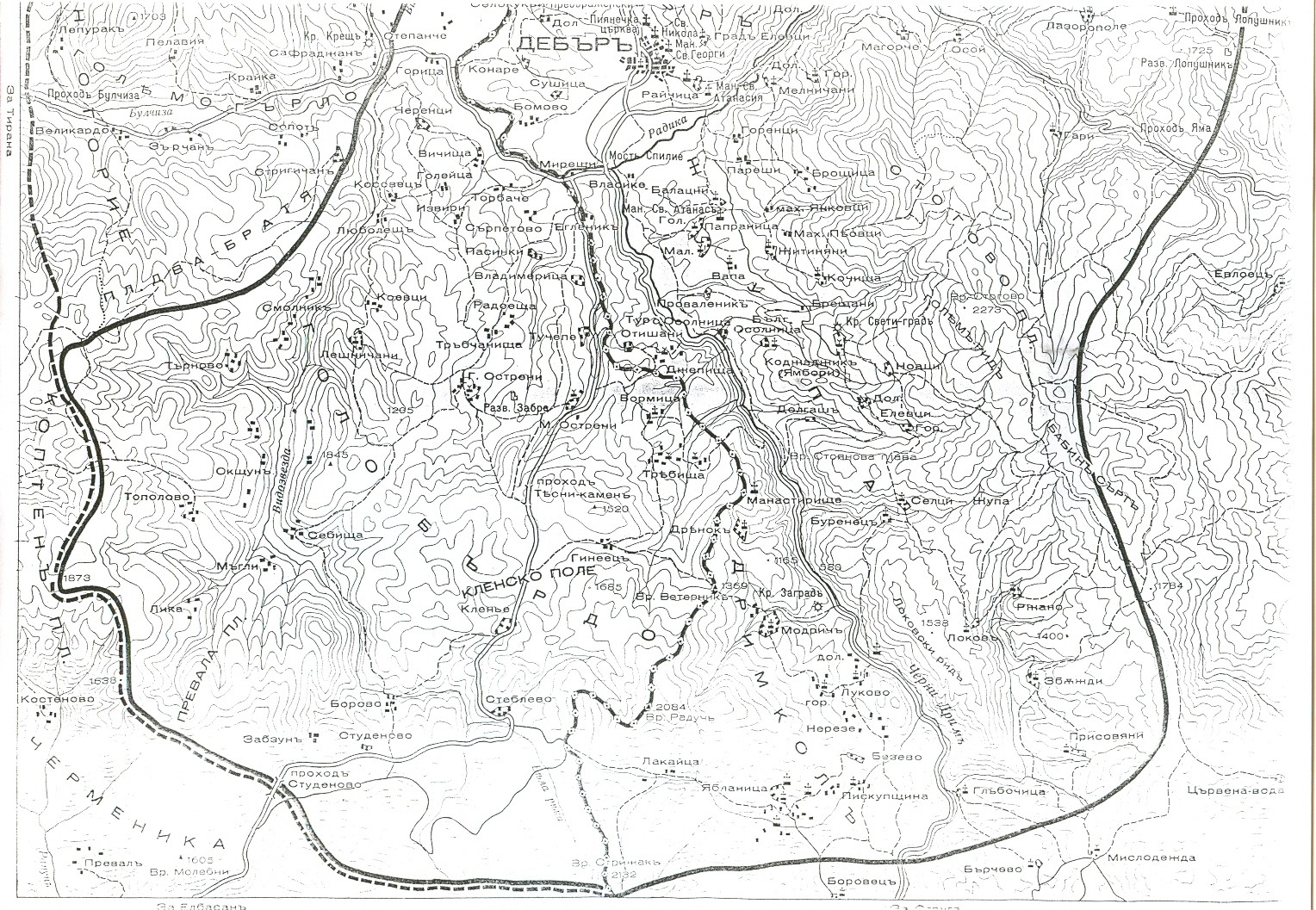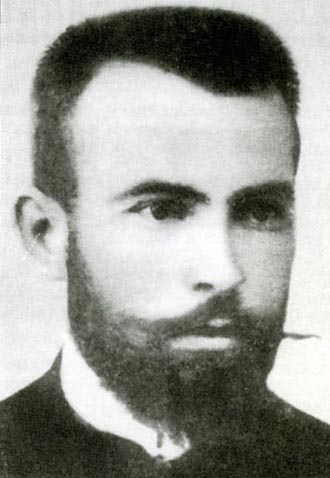|
Gjinovec
Gjinovec ( bg, Гиновец, mk, Ѓиновец) is a village in the former Trebisht in Dibër County in northeastern Albania. At the 2015 local government reform it became part of the municipality Bulqizë. It is situated within the Gollobordë region, near the border with North Macedonia. Name The name of the village is derived from a personal name ''Gjin'' or ''Gin'' with the suffix ''ovec''. "Името е образувано со суфиксот -овец од личното име Ѓин или Гин и има госесивно значење." Demographics A demographic Bulgarian survey of the population of the village, done in 1873, recorded the village as having 90 households with 134 male Bulgarian Christian residents and 118 male Muslim (Pomak) residents. The inhabitants of Gjinovec are speakers of a south Slavic language "Heute umfaßt das Gebiet von Golloborda in Albanien 22 Dörfer, die verwaltungstechnisch auf drei verschiedene Gemeinden aufgeteilt sind: 1. ... [...More Info...] [...Related Items...] OR: [Wikipedia] [Google] [Baidu] |
Trebisht
Trebisht ( mk, Требишта, bg, Требище or Требища) is a former municipality in the Dibër County, eastern Albania. At the 2015 local government reform it became a subdivision of the municipality Bulqizë. The population at the 2011 census was 993.2011 census results Geography The village is situated in the geographical area of Gollobordë. Within the municipality, the village of Trebisht consists of the three neighborhoods of Trebisht-Muçinë, Trebisht-Balaj, and Trebisht-Çelebi. (in the local Macedonian dialect - Dunomala, Gurnomala a ...[...More Info...] [...Related Items...] OR: [Wikipedia] [Google] [Baidu] |
Gollobordë
Gollobordë ( sq-definite, Golloborda, bg, Голо Бърдо/Golo Bărdo, mk, Голо Брдо/Golo Brdo) refers to a geographical area of traditionally 24 villages of which 18 are situated primarily in eastern Albania, with a small portion consisting of six villages lying within North Macedonia. This region is located within the Dibër and Elbasan counties which contain both Macedonian and Albanian villages. This region, like neighboring regions, has historically been economically linked to the city of Debar, which was traditionally referred to by inhabitants as simply "the City". History Ottoman period The Islamization process is held to have occurred in Golloborda relatively late in Ottoman times.Toncheva, Veselka (2013). "The Slavonic Community from the Golo Bardo Region, Republic of Albania: Traditions, Music, Identity". ''Our Europe. Ethnography – Ethnology – Anthropology of Culture''. Volume 2. Pages 40–42 In 1519, the region was still entirely Christian.Lima ... [...More Info...] [...Related Items...] OR: [Wikipedia] [Google] [Baidu] |
Bulqizë
Bulqizë (; sq-definite, Bulqiza) is a Municipalities of Albania, municipality in Dibër County, northeastern Albania. The municipality consists of the administrative units of Fushë-Bulqizë, Gjoricë, Martanesh, Ostren, Shupenzë, Trebisht, Zerqan with Bulqizë constituting its seat. As of the Institute of Statistics (Albania), Institute of Statistics estimate from the 2011 census, there were 8,177 people residing in Bulqizë and 32,210 in Bulqizë Municipality. Demographic history Bulqizë is recorded in the Ottoman Empire, Ottoman ''defter'' of 1467 as a ''Hass (Ottoman), hass-ı mir-liva'' and ''Dervendjis, derbendci'' settlement in the vilayet of ''Gollobordë, Dulgoberda''. Although the register's complete survey on the village is missing, the following household heads are attested: ''Dimitri Bogdani'', ''Kolë Sharqini'', ''Gjin Kimeza'', ''Gjin Kolandi'', ''Nikolla Budi'', ''Martin Bardi'', ''Progon Buljani'', ''Maqe Kimëza'', ''Istvan Nenada'', ''Progon Bogdani'', '' ... [...More Info...] [...Related Items...] OR: [Wikipedia] [Google] [Baidu] |
Dibër County
Dibër County (; sq, Qarku i Dibrës) is one of the 12 counties of the Republic of Albania, spanning a surface area of with the capital in Peshkopi. The county borders on the counties of Durrës, Elbasan, Kukës, Lezhë, Tirana and the country of North Macedonia. It is divided into the four municipalities of Bulqizë, Dibër, Klos and Mat. The municipalities are further subdivided into 290 towns and villages in total. Topographically, the county is dominated by mountainous and high terrain, with a great variety of natural features including valleys, canyons, gorges, rivers, glacial lakes and dense forests. Various mountains ranging between meters above sea level run the length of the county from north to south, including the Korab mountains in the east with Mali i Gramës and Korab at an altitude of being the highest mountain in the county and as well as in Albania. The Dejë mountain rises in the center, while in the east the county is dominatet by the Lura mountains. ... [...More Info...] [...Related Items...] OR: [Wikipedia] [Google] [Baidu] |
Albania
Albania ( ; sq, Shqipëri or ), or , also or . officially the Republic of Albania ( sq, Republika e Shqipërisë), is a country in Southeastern Europe. It is located on the Adriatic and Ionian Seas within the Mediterranean Sea and shares land borders with Montenegro to the northwest, Kosovo to the northeast, North Macedonia to the east and Greece to the south. Tirana is its capital and largest city, followed by Durrës, Vlorë, and Shkodër. Albania displays varied climatic, geological, hydrological, and morphological conditions, defined in an area of . It possesses significant diversity with the landscape ranging from the snow-capped mountains in the Albanian Alps as well as the Korab, Skanderbeg, Pindus and Ceraunian Mountains to the hot and sunny coasts of the Albanian Adriatic and Ionian Sea along the Mediterranean Sea. Albania has been inhabited by different civilisations over time, such as the Illyrians, Thracians, Greeks, Romans, Byzantines, Venetians, and Ot ... [...More Info...] [...Related Items...] OR: [Wikipedia] [Google] [Baidu] |
North Macedonia
North Macedonia, ; sq, Maqedonia e Veriut, (Macedonia before February 2019), officially the Republic of North Macedonia,, is a country in Southeast Europe. It gained independence in 1991 as one of the successor states of Socialist Federal Republic of Yugoslavia, Yugoslavia. It is a landlocked country bordering Kosovo to the northwest, Serbia to the north, Bulgaria to the east, Greece to the south, and Albania to the west. It constitutes approximately the northern third of the larger geographical Macedonia (region), region of Macedonia. Skopje, the capital and largest city, is home to a quarter of the country's 1.83 million people. The majority of the residents are ethnic Macedonians (ethnic group), Macedonians, a South Slavs, South Slavic people. Albanians in North Macedonia, Albanians form a significant minority at around 25%, followed by Turks in North Macedonia, Turks, Romani people in North Macedonia, Romani, Serbs in North Macedonia, Serbs, Bosniaks in North Mac ... [...More Info...] [...Related Items...] OR: [Wikipedia] [Google] [Baidu] |
Bulgarians
Bulgarians ( bg, българи, Bǎlgari, ) are a nation and South Slavic ethnic group native to Bulgaria and the rest of Southeast Europe. Etymology Bulgarians derive their ethnonym from the Bulgars. Their name is not completely understood and difficult to trace back earlier than the 4th century AD, but it is possibly derived from the Proto-Turkic word ''*bulģha'' ("to mix", "shake", "stir") and its derivative ''*bulgak'' ("revolt", "disorder"). Alternative etymologies include derivation from a compound of Proto-Turkic (Oghuric) ''*bel'' ("five") and ''*gur'' ("arrow" in the sense of "tribe"), a proposed division within the Utigurs or Onogurs ("ten tribes"). Citizenship According to the Art.25 (1) of Constitution of Bulgaria, a Bulgarian citizen shall be anyone born to at least one parent holding a Bulgarian citizenship, or born on the territory of the Republic of Bulgaria, should they not be entitled to any other citizenship by virtue of origin. Bulgarian citizenship sh ... [...More Info...] [...Related Items...] OR: [Wikipedia] [Google] [Baidu] |
Pomak
Pomaks ( bg, Помаци, Pomatsi; el, Πομάκοι, Pomáki; tr, Pomaklar) are Bulgarian-speaking Muslims inhabiting northwestern Turkey, Bulgaria and northeastern Greece. The c. 220,000 strong ethno-confessional minority in Bulgaria is recognized officially as Bulgarian Muslims by the government. The term has also been used as a wider designation, including also the Slavic Muslim populations of North Macedonia and Albania. Most Pomaks today live in Turkey where they have settled as muhacirs as a result of escaping previous ethnic cleansing in Bulgaria. Bulgaria recognizes their language as a Bulgarian dialect whereas in Greece and Turkey they self-declare their language as the Pomak language. The community in Greece is commonly fluent in Greek, and in Turkey, Turkish, while the communities in these two countries, especially in Turkey, are increasingly adopting Turkish as their first language as a result of education and family links with the Turkish people. They are ... [...More Info...] [...Related Items...] OR: [Wikipedia] [Google] [Baidu] |
South Slavic Languages
The South Slavic languages are one of three branches of the Slavic languages. There are approximately 30 million speakers, mainly in the Balkans. These are separated geographically from speakers of the other two Slavic branches (West and East) by a belt of German, Hungarian and Romanian speakers. History The first South Slavic language to be written (also the first attested Slavic language) was the variety of the Eastern South Slavic spoken in Thessaloniki, now called Old Church Slavonic, in the ninth century. It is retained as a liturgical language in Slavic Orthodox churches in the form of various local Church Slavonic traditions. Classification The South Slavic languages constitute a dialect continuum. Serbian, Croatian, Bosnian, and Montenegrin constitute a single dialect within this continuum. *Eastern ** Bulgarian – (ISO 639-1 code: bg; ISO 639-2 code: bul; SIL code: bul; Linguasphere: 53-AAA-hb) ** Macedonian – (ISO 639-1 code: mk; ISO 639-2(B) code: mac; IS ... [...More Info...] [...Related Items...] OR: [Wikipedia] [Google] [Baidu] |
Macedonian Language
Macedonian (; , , ) is an Eastern South Slavic language. It is part of the Indo-European language family, and is one of the Slavic languages, which are part of a larger Balto-Slavic branch. Spoken as a first language by around two million people, it serves as the official language of North Macedonia. Most speakers can be found in the country and its diaspora, with a smaller number of speakers throughout the transnational region of Macedonia. Macedonian is also a recognized minority language in parts of Albania, Bosnia and Herzegovina, Romania, and Serbia and it is spoken by emigrant communities predominantly in Australia, Canada and the United States. Macedonian developed out of the western dialects of the East South Slavic dialect continuum, whose earliest recorded form is Old Church Slavonic. During much of its history, this dialect continuum was called "Bulgarian", although in the 19th century, its western dialects came to be known separately as "Macedonian". Stan ... [...More Info...] [...Related Items...] OR: [Wikipedia] [Google] [Baidu] |
Bulgarian Language
Bulgarian (, ; bg, label=none, български, bălgarski, ) is an Eastern South Slavic language spoken in Southeastern Europe, primarily in Bulgaria. It is the language of the Bulgarians. Along with the closely related Macedonian language (collectively forming the East South Slavic languages), it is a member of the Balkan sprachbund and South Slavic dialect continuum of the Indo-European language family. The two languages have several characteristics that set them apart from all other Slavic languages, including the elimination of case declension, the development of a suffixed definite article, and the lack of a verb infinitive. They retain and have further developed the Proto-Slavic verb system (albeit analytically). One such major development is the innovation of evidential verb forms to encode for the source of information: witnessed, inferred, or reported. It is the official language of Bulgaria, and since 2007 has been among the official languages of the Eur ... [...More Info...] [...Related Items...] OR: [Wikipedia] [Google] [Baidu] |
Macedonian Muslims
The Macedonian Muslims ( mk, Македонци-муслимани, Makedonci-muslimani), also known as Muslim Macedonians or ''Torbeši'' ( mk, Торбеши), and in some sources grouped together with Pomaks, are a minority religious group within the community of ethnic Macedonians who are Sunni Muslims (with Sufi influences being widespread among the population). They have been culturally distinct from the majority Orthodox Christian Macedonian community for centuries, and are ethnically and linguistically distinct from the larger Muslim ethnic groups in the greater region of Macedonia: the Albanians, Turks and Romanis. However, some Torbeši also still maintain a strong affiliation with Turkish identity and with Macedonian Turks. The regions inhabited by these Macedonian-speaking Muslims are Debarska Župa, Poreče (Suva Gora), Dolni Drimkol (particularly enclosing the villages of Oktisi and Labuništa), Reka, and Golo Brdo (in Albania). Origins The Macedonian Muslims ... [...More Info...] [...Related Items...] OR: [Wikipedia] [Google] [Baidu] |





